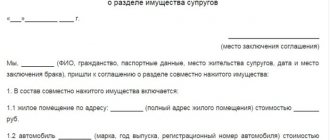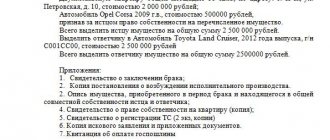Every year in Russia, 60% of marriages break up. Some divorces are accompanied by lengthy litigation. But you can divide your property together without costly, lengthy, and unpleasant court proceedings. It is enough to conclude an agreement on the division of property between the spouses.
It is concluded on the basis of 4, 34,38,39 articles of the Family Code and 128, 129, 213, 254 articles of the Civil Code. The listed legislative acts regulate the procedure for dividing property.
The rights and obligations of the parties are regulated by Articles 310, 393, 394, 395, 396, 398 of the Civil Code of the Russian Federation. Based on these laws, an agreement on the division of property between spouses is given legal force equal to a court decision. Violating the terms of the agreement is illegal. It leads to the payment of compensation.
Types of contracts
The division of joint property of spouses for 2021 was carried out by concluding two types of agreements. The differences between them were contained in the name, legal framework, and transaction structure.
The agreement on the division of property determines the rights to transfer into personal ownership the jointly acquired property of the spouses. For example, a married couple purchased an apartment, a dacha, and two cars during marriage. After the deal is concluded, the apartment and one car will belong to the wife, and the dacha and the second car will belong to the husband.
The Share Determination Agreement defines the shared ownership. It is usually concluded when a couple owns real estate, which cannot be sold or exchanged. Then an agreement is concluded in which ½ or 1/3 of the share goes to one party, and ½ or 2/3 to the other party.
Equal and unequal division
By law, each spouse has the right to half of the joint property. Exceptions are made mainly for families with children. But an agreement on the division of property allows the parties to independently determine the size of their shares. The main thing is to indicate the reasons why the property was divided unevenly.
Equal division of jointly acquired property implies either the conclusion of an agreement on the determination of shares, or the payment of monetary compensation.
Deal nuances
There are a number of requirements that a property division agreement must meet. These include:
- regulatory framework based on the current legislation of the Russian Federation;
- a correctly compiled document in written form;
- availability of precise wording.
The text should indicate in detail all the details: the identity of the parties, their marital status, the period of entry into force of the agreements, the date and place of the transaction.
An agreement on the division of jointly acquired property can:
- touch all or only part of the property;
- combine several methods of dividing property.
For example, the text of the document may contain additional conditions that fall under the definition of exchange, lease, loan, etc. In this case, the regulatory framework includes those legislative acts that relate to the conclusion of such transactions.
The terms of the transaction can be changed or terminated by mutual agreement.
When to make a deal?
The transaction between spouses can take place both before and after the divorce. Omega Group lawyers recommend concluding a marriage transaction. This will save on personal income tax payments.
The participation of both parties when communicating with lawyers is optional. It is enough to discuss your financial claims, determine a list of expensive items and seek legal assistance.
Period of entry into legal force
The parties receive the right of ownership of property acquired jointly during marriage when it is specified in the contract. If a clear date is not specified, the document comes into force from the moment the transaction is concluded.
Sample agreement on division of marital property
AGREEMENT
on the division of property of former spouses
Moscow city
The twenty-sixth of August two thousand and thirteen
We, citizens of the Russian Federation:
Blinov Vladimir Nikolaevich, born on April 24, 1979, place of birth: Kaluga, Kaluga region, Russian passport: 30 02 571743 issued by the Department of Internal Affairs of the Leninsky district of the Kaluga region on May 11, 2004, department code: 403-013, registered locally residence: Moscow region, mountains. Podolsk, st. Stroitelnaya, 7, apt. 41
And
Blinova Oksana Viktorovna, born June 12, 1984, place of birth: Moscow, Russian Federation passport: 111111111, issued by the Solntsevo district office of the Federal Migration Service of Russia in Moscow on October 11, 2009, department code: 770-071, registered locally residence: Moscow, st. Berezina, building 11, building 1, apt. 39, hereinafter referred to as “parties to the agreement, former spouses” when referred to together,
in connection with the dissolution of a marriage registered on 08/09/2008 by the Wedding Palace No. 1 of the Moscow Civil Registry Office, act record No. 1159, Marriage Certificate III-MU No. 723425, terminated on 03/21/2013 on the basis of a court decision on divorce (amicable judge of the judicial district No. 143 of the Solntsevo district of Moscow) , about which the Dzerzhinsky department of the Civil Registry Office of the Main Directorate of the Civil Registry Office of the Moscow Region compiled a record of the act of divorce No. 71 on April 20, 2013, issued a Divorce Certificate III-IK No. 549071,
voluntarily, by mutual agreement, in order to settle property rights and obligations, we entered into this agreement on the division of property, property rights and debt obligations (hereinafter referred to as property) acquired by the parties to the agreement during the marriage, i.e. from 08/09/2008 to 03/21/2013
1. When dividing property, the parties to an agreement on the division of property are guided by the principle of equality of property shares established by the Family Code of the Russian Federation (Article 39, clause 1), recognizing that there were no legal circumstances and grounds for deviation from this principle and do not currently exist, including the interests of one of the spouses worthy of attention (Article 39, paragraph 2).
2. Recognition by the parties to the agreement of the circumstances named in paragraph 1 also implies that their compliance with the principle of equality of shares does not violate the legal rights and interests of their minor daughter Anna Vladimirovna Blinova, born on February 22, 2010.
3. If, as a result of the division of property of the former spouses under this agreement, it is established that the share of one of the spouses in its value and/or property terms turns out to be greater than the share of the other spouse, then this circumstance should be interpreted by the parties to the agreement and third parties not as a violation of the rights of one from the participants in the agreement on the division of property, but as a voluntary deviation by former spouses from the principle of equality of shares in accordance with the right granted to them by the Family Code of the Russian Federation (Article 39, paragraph 1).
4. For the convenience of calculations, the division of the spouses’ property is carried out by the parties as of March 1, 2013.
5. The subject of this agreement is the following property, jointly owned by the former spouses:
5.1. a Milli brand refrigerator worth 50,000 (fifty thousand) rubles;
5.2. a kitchen set with built-in appliances worth 30,000 (thirty thousand) rubles;
5.3. built-in wardrobes worth 100,000 (one hundred thousand) rubles;
5.4. a sofa worth 75,000 (seventy-five thousand) rubles;
5.5. air conditioner worth 10,000 (ten thousand) rubles;
5.6. a Toshiba laptop computer worth 15,000 (fifteen thousand) rubles;
5.7. jewelry (luxury items) worth 300,000 (three hundred thousand) rubles;
5.8. a Toshiba TV worth 17,000 (seventeen thousand) rubles;
5.9. Philips TV worth 30,000 (thirty thousand) rubles;
5.10. Bosh washing machine worth 30,000 (thirty thousand) rubles;
5.11. a Stinger bicycle worth 15,000 (fifteen thousand) rubles;
5.12. a Bosh vacuum cleaner worth 8,000 (eight thousand) rubles;
5.13. From the common funds, the parties to the agreement paid tuition fees for O.V. Blinova. at the Moscow Humanitarian Institute, in total for the period from 09.2009 to 05.2012, 6 payments were made from the common funds of the former spouses for the education of O.V. Blinova. in the amount of 108,000 (one hundred eight thousand) rubles;
5.14. In 2010, from the jointly acquired funds, the parties to the agreement paid for services for the renovation of an apartment at the address: Moscow, st. Solntsevsky proezd, 11, apt. 11, where the former spouses lived during the marriage, in the amount of 200,000 (two hundred thousand) rubles;
5.15. the right to claim an apartment worth 5,194,996-76 (five million one hundred ninety-four thousand nine hundred ninety-six rubles 76 kopecks) rubles in a house under construction at the address: Moscow region, Mytishchi, cadastral number of the land plot 50:21:120303:359 , section “4”, floor 10, serial number on site 1, conditional apartment number 244, total area 65.82 sq.m. (hereinafter referred to as the apartment under construction).
5.16. This right arose among the former spouses on the basis of agreement No. KM/6-252-G for participation in shared construction of a house, concluded between V.V. Blinov. and SK Business LLC May 5, 2012
6. The price of the apartment was paid by the former spouses in accordance with the mentioned agreement in full at the expense of loan funds received by the former spouses under loan agreements with ZAO Raiffeisenbank and the Branch of the open joint-stock company Joint-Stock Commercial Bank Baltika. The deadline for transferring ownership of the apartment is 2015 (clause 6.1 of the agreement).
7. Taking into account the foregoing, the former spouses admit that during the marriage they acquired as joint property “positive property” in the amount of 6,182,996.76 (six million one hundred eighty-two thousand nine hundred ninety-six rubles 76 kopecks) rubles.
8. The parties to the agreement on the division of property acknowledge that each of them has a share in the specified property in the amount of ½, which in value terms corresponds to 3,091,498.38 (three million ninety-one thousand four hundred ninety-eight rubles 38 kopecks) rubles (6,182,996 ,76:2).
9. At the time of divorce, the following debt obligations remained unpaid by the former spouses.
9.1. The balance of debt under the loan agreement No. KA-V-P 1/09/2012 dated May 16, 2012 in the amount of 4,499,309.55 rubles and accrued interest for using the loan in the amount of 1,713.44 kopecks, total as of March 1, 2013 4501022.99 (four million five hundred one thousand twenty-two rubles 99 kopecks) rubles, concluded by the former spouses with the Branch of the Open Joint Stock Company Joint Stock Commercial Bank "Baltika";
9.2. The balance of debt under the loan agreement (loan application No. PL 21124115151518) in the amount of 671327.50 (six hundred seventy-one thousand three hundred twenty-seven rubles 50 kopecks) rubles as of March 1, 2013, concluded between V.N. Blinov and ZAO Raffisenbank.
9.3. The total balance of the debt under the two mentioned agreements is 5172350.49 (five million one hundred seventy-two thousand three hundred fifty rubles 49 kopecks) rubles (4501022.99+671327.50).
10. The parties to the agreement acknowledge that during the marriage they jointly acquired debt obligations in the amount of 5,172,350.49 rubles (“negative property”). Taking into account the provisions of the Family Code of the Russian Federation, the former spouses agree that each of them is obliged to pay the said debt in an equal share with the other spouse, or 2586175.24 (two million five hundred eighty six thousand one hundred seventy five rubles 24 kopecks) rubles (5172350.49: 2).
11. The division of jointly acquired property is carried out by the parties in the following order.
11.1. Belonging to V.N. Blinov in the amount of ½ of the right to property and results of services listed in subparagraphs 5.1. – 5.14. Clause 5 of this agreement from the moment it comes into force becomes the personal property of O.V. Blinova. From this moment on, Blinov V.N. does not have any rights to the property listed in the named subparagraphs, including the right to demand from O.V. Blinova. compensation for the results of services provided for the renovation of the above-mentioned apartment and training for O.V. Blinova. in an educational institution. The things listed in the named subparagraphs of this agreement, from the moment it comes into force, acquire the status of Oksana Viktorovna Blinova’s personal property. Since the named things at the time of signing this agreement are in the possession of O.V. Blinova, an act of their transfer is not drawn up, and they are considered transferred to her from the moment this agreement comes into force. In total, in accordance with subclauses 5.1. – 5.14. clause 5 of this agreement into the personal property of O.V. Blinova. Blinov V.N. transfers its property rights in the amount of 494,000 (four hundred ninety-four thousand rubles) rubles (998,000: 2).
12. The division of bank debts and claims to a standing apartment is carried out by the parties to the agreement in the following order.
12.1. The balance of the debt of CJSC "Raffeisenbaku" in the amount of 671,327.50 (six hundred seventy-one thousand three hundred twenty-seven rubles 50 kopecks) rubles Blinov V.N. undertakes to pay the bank individually in full. Thus, Blinov V.N. assumes the obligations of Blinova O.V. pay ZAO Raffisenbank a sum of money in the amount of 335663.75 (three hundred thirty-five thousand six hundred sixty-three rubles 75 kopecks) rubles (671327.50:2).
12.2. The balance of the debt to Baltika Bank in the amount of ½ of its part, which corresponds to a monetary amount of 2,250,511.49 (two million two hundred fifty thousand five hundred eleven rubles 49 kopecks) rubles (4501022.99:2) Blinova O.V. translates to Blinov V.N. with the consent of the Baltika Bank branch. Consent to the transfer of debt is issued by the bank branch in writing, is attached to this agreement and is an integral part of it. Blinov V.N. accepts the said part of the debt in full and becomes the sole debtor (borrower) of the bank for the amount of the balance of the loan debt, which as of March 1, 2013 is 4,501,022.99 (four million five hundred one thousand twenty-two rubles 99 kopecks) rubles. From the moment this agreement comes into force, the obligation of Blinova O.V. under the loan agreement are terminated and transferred to V.N. Blinov. in full. Blinov V.N. undertakes to fulfill these obligations in accordance with the agreement and properly, including timely payment of payments and interest on the loan in accordance with the Loan Repayment Schedule No. KI-M-P 1/09/2012-747 (Appendix No. 1 to the loan agreement No. KI-M- P 1/09/2012 747 from 05/12/2012)
13. Thus, as a result of this agreement, Blinov V.N. transferred to Blinova O.V. rights to property and its obligations are accepted in the amount of 3080175.24 (three million eighty thousand one hundred seventy-five rubles 24 kopecks) rubles (494000 + 335663.75 + 2250511.49).
14. In connection with the acceptance by Blinov V.N. assume the debt of Blinova O.V. before Baltika Bank and the transfer of the said property rights to it, the latter, as a counter-provider, yields to V.N. Blinov. its right to claim an apartment under construction, named in subclause 5.15 of clause 5 of this agreement, which it has on the basis of the provisions of the Family Code of the Russian Federation (Article 34, clause 2), in the amount of ½ in the amount of 2597498.38 (two million five hundred ninety seven thousand four hundred ninety-eight rubles 38 kopecks) rubles, and Blinov V.V. accepts this right in full. From the moment this agreement on the division of property comes into force, Blinov O.V. loses any rights to the apartment under construction.
15. From the moment this agreement comes into force, all rights to the apartment under construction pass to V.N. Blinov, who has the right, in accordance with the law and the shared construction agreement, to assign them to any third party without the consent of O.V. Blinova, and upon completion of construction of the apartment obtain it as personal property and dispose of the right to the apartment at his own discretion without the consent of O.V. Blinova.
16. After the entry into force of this agreement, Blinova O.V. does not have the right to lay claim to an apartment under construction, demand it from the developer, assign the right to it to third parties, or exercise any other rights.
17. The parties to this agreement do not dispute the fact that from the moment of dissolution of the marriage between them, all payments under the mentioned loan agreements were made by V.N. Blinov. from his personal funds.
18. An agreement on the division of property of former spouses comes into force from the moment it is signed by the former spouses, and if it is necessary to register it with the state, from the moment of such registration.
19. This agreement has been drawn up in 5 original copies: one for each of the parties, one is sent to a branch of Baltika Bank OJSC, one to SK Business LLC, one to the institution at the place of registration of the shared construction agreement for an apartment under construction.
20. The provisions of the Family Code of the Russian Federation (Articles 33-39), Civil Code (Articles 382-392) are known and understandable to the parties to the agreement.
21. Signatures of the parties to the agreement:
21.1._________________________________Blinova O.V.
21.2 __________________________________Blinov V.N.
20.11.2018
Text of the agreement
An agreement on the division of jointly acquired property must contain:
- references to the average market value of the subject of the contract;
- date and procedure for execution of agreements;
- conditions for protecting the parties from violations;
- procedure for resolving disputes.
Thus, the contents of the document include:
- full passport details of the parties;
- a list of joint property with exact parameters and prices;
- terms of division;
- mechanism for suppressing violations and resolving claims.
This document is certified by a notary. Due to incompetence or unwillingness to study an individually compiled document, he may suggest abandoning non-standard wording. In this case, you should require a written refusal, which is motivated by references to current legislation. Without it, the notary has no right to refuse to certify the document.
What property of spouses is subject to division by a notary?
Spouses can divide all joint property from a notary (Article 38 of the RF IC). At the legislative level, property that a husband and wife acquired during marriage is considered joint. A complete list of property subject to division by spouses at the notary is given in Article 34 of the RF IC. The list includes:
- income from any activity;
- pensions, benefits, payments that do not have a designated purpose;
- movable and immovable property;
- deposits, shares, shares;
- securities;
- other property acquired during marriage.
In this case, it does not matter which member of the couple has entered into a purchase and sale agreement or has opened an account with a banking organization. In practice, one of the spouses can do housework or care for children. This does not deprive the husband or wife of the right to joint property, even if the participant in the marriage had no income. Good reasons that do not allow a spouse to carry out work activities may also be taken into account (Article 34 of the RF IC).
However, not all property of spouses is recognized as jointly acquired property. Part of the property of a husband and wife is not subject to division by a notary. The following is recognized as the personal property of each spouse (Article 36 of the RF IC):
- real estate objects owned by a husband and wife before the official registration of family legal relations;
- property received as a gift by a husband or wife during marriage;
- property inherited by a specific spouse;
- a piece of real estate obtained as a result of a gratuitous transaction;
- things for individual use, even if they were acquired from the common funds of the spouses;
- rights to the results of intellectual activity.
Attention:
The exception is jewelry and luxury items (Article 36 of the RF IC). This category of property is recognized as the joint property of the spouses and is subject to division by a notary or through the court.
It is also worth noting that if a married couple has drawn up a marriage contract, then this document establishes provisions on who will receive this or that property in the event of divorce, and accordingly, the division of the property of the spouses at the notary is carried out in this order.
Samples and forms of agreement between spouses
Since agreements between the parties are individual in nature, there is no single sample agreement or application for the division of marital property. Omega Group lawyers have developed several documents for typical situations:
- claim for division of property after divorce;
- application for division of property after divorce through the registry office;
- applications for division of property of married spouses;
agreement with compensation.
The content of the agreement and the terms of division of property are influenced by the presence of debts, loans, mortgages and other factors. Therefore, before using a standard sample application for division of property, it is worth consulting with a specialist.
When do you need to formalize the division of marital property with a notary?
Husband and wife have the right to distribute property during marriage. It is also possible to divide property during a divorce (Article 38 of the RF IC). Either spouse can offer to prepare a voluntary agreement for the division of property with a notary. The document is drawn up only if there is mutual consent. If one of the spouses opposes it, or disputes arise during the preparation of the agreement, distribution of property through a notarial procedure is impossible. The division of property will take place in court (Article 38 of the RF IC).
Attention
If the husband and wife divorce, the distribution of common property must be completed within 3 years. However, the statute of limitations for the division of property (if we are talking about the judicial division of real estate) begins to be calculated from the moment of violation of the rights of one of the spouses. With a notary, a husband and wife can distribute property after a divorce indefinitely. If the spouses were able to come to an agreement and continue to use the property together without hindrance, the division of property need not be carried out.









